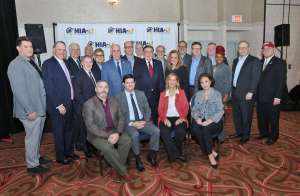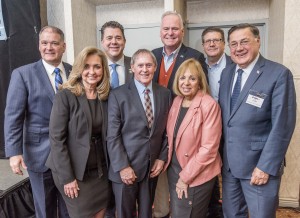
HIA-LI’s 46th Annual Meeting and Legislative Program marked a significant confluence of ideas and strategies from key regional and statewide policymakers and leaders. This year’s event was a vibrant forum for discussing Long Island’s trajectory, focusing on economic growth, infrastructure, environmental sustainability, and adapting to new societal post-pandemic norms.
Here at HIA-LI, we’re extremely proud of the strides made in the Long Island Innovation Park at Hauppauge, a major economic engine with 55,000 employees and $13 billion in economic output. Significant achievements include new branding initiatives, such as the introduction of flags and signage as well as vital infrastructure developments such as sewage expansion.
Our focus on sustainable development is evident in our plans for electric vehicle integration and a transportation study for the park. We’ve broadened the scope of our Economic Development Task Force, while our Workforce Development Task Force has been pivotal in bridging the gap between businesses and educational institutions.
I’m especially proud of our membership growth of over 21 percent and our successful engagement strategies across all HIA-LI social media channels. That includes a new partnership with Going Local TV as well as the growth of our Business Steps Up podcast.
Kicking off the Legislative Program, newly elected Suffolk County Executive Ed Romaine’s comments were particularly noteworthy for its emphasis on environmental and infrastructural initiatives. He passionately advocated for a referendum on clean water, seeing it as vital for Suffolk County’s ecological future. Romaine highlighted the crucial need for the electrification of the Long Island Rail Road’s Port Jefferson line, explaining how it would revolutionize local transportation and stimulate economic growth. Further, he underscored the importance of securing equitable funding from Albany, essential for the region’s comprehensive development.
Smithtown Supervisor Ed Wehrheim – who also serves on the Long Island Regional Planning Council – shared his vision for Smithtown’s infrastructure development, specifically referencing his advocacy for sewage treatment plants as a catalyst for growth and environmental protection. Wehrheim emphasized the need for community-centric governance, stressing the importance of civic engagement in shaping effective local policies.
John Walser, Director of Economic Development at the Town of Islip, representing Supervisor Angie Carpenter, provided insights into the economic development strategies being implemented in Suffolk’s second largest township. He elaborated on initiatives aimed at strengthening local businesses and attracting new investment. Walser acknowledged the pivotal role of the Long Island Regional Planning Council in coordinating the region’s economic strategies.
We were once again honored that Lieutenant Governor Antonio Delgado joined us virtually via “live” Zoom. He articulated the state administration’s dedication to supporting Long Island’s communities. Delgado spoke on the significance of public-private partnerships in achieving community safety, affordability, and economic prosperity. He further highlighted the governor’s commitment to expanding the FAST NY program to prepare sites for development, fostering New York’s competitive edge in national job creation.
Delgado also discussed the “Long Island Forward” program, aimed at addressing the residential housing shortage by encouraging municipalities to create shovel ready sites through targeted incentives. The goal, he said, is to retain local talent, allowing young people to raise their families on Long Island with an eye towards strengthening New York’s economy.
After each speaker had a chance to present, a lively discussion ensued on a variety of timely topics such as reviving Long Island’s economy post-COVID-19, emphasizing technological innovation; addressing Long Island’s affordable housing crisis; the need for infrastructure improvements, especially modern solutions to traditional septic systems; and, advocating for environmental sustainability through green initiatives.
HIA LI’s 46th Annual Meeting and Legislative Program demonstrated the commitment and foresight of Long Island’s leaders. It also showed that the dedication and resilience of our members are the bedrock of our success. The discussions laid down a comprehensive roadmap for a sustainable and prosperous future in the bi-county region.
As we step into 2024, I encourage everyone to engage actively with HIA-LI, contributing to the collective growth and prosperity of this beautiful region we all call home.

